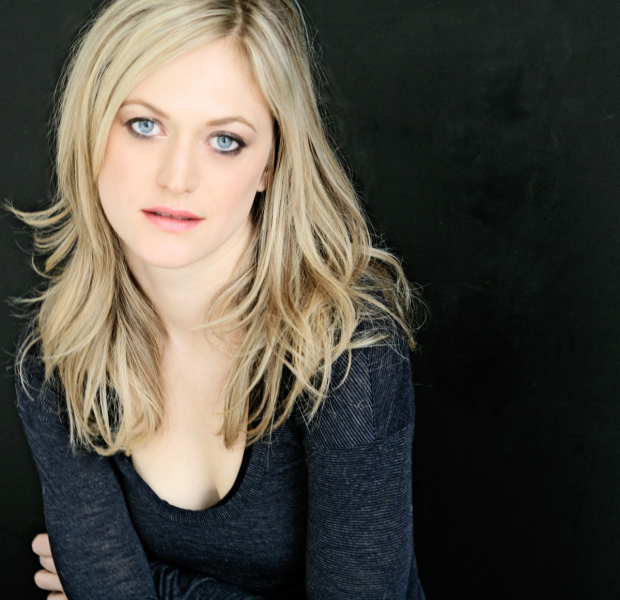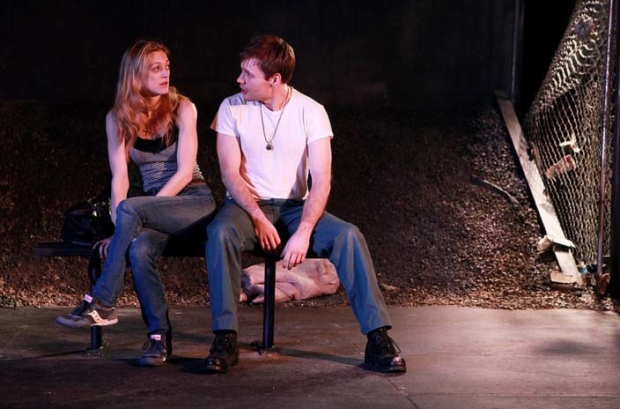Marin Ireland Takes the Express to Ironbound
After a rescheduled television shoot left Marin Ireland with a four-month window, she made a last-minute leap into Ironbound, Martyna Majok's new play at Rattlestick Playwrights Theater. Gina Gershon had exited the production during rehearsals, leaving an opening for the role of Darja, a money-strapped Polish immigrant whom we find waiting at a bus stop in the working-class Ironbound district of Newark, New Jersey.
"It was definitely an exercise in liberation for me," says Ireland, who had nine days to prepare a character who never leaves the stage and whose journey spans 20 years, three significant others, and a lifetime of envy for the wealthy elite. Ireland's IMDB page is overflowing with screen credits, including recent roles in NBC's The Slap, HBO's Girls, and Showtime's Masters of Sex. But with an impressive list of stage credits to match, she never neglects her theater muscle for long. And thanks to a little divine intervention, "This muscle is getting a good workout."

(© Michael Tammaro)
You came into Ironbound as a last-minute replacement. Tell me how this play landed on your doorstep.
I was supposed to be doing a TV show right now — a show for Amazon called Sneaky Pete — and we were supposed to start shooting in February. Then there was a change of showrunner at the last minute and it was pushed to June. Suddenly I had four months of nothing. That was around the first week of February and I guess they were already in rehearsals [for Ironbound]. Then I got a phone call from [the director] Daniella [Topol] saying, "Could you start tomorrow or the next day?"
How do you prepare for such a hefty role in such a short amount of time?
There was something great about it being so fast for me. You just throw yourself into it and [say], Wow, at some point there will be the illusion of a character onstage and I won't even really know how that happened or where she came from. I didn't really have the time to do anything except lean into the words and the energy and the dialect. It was actually very freeing in a lot of ways, because I had to just sort of go for it. And for sure the desperation was something I could access with only a few days to learn it. [laughs]
Did you know anything about the play going in?
I had heard about the play actually. I have a lot of friends who had told me about [the playwright] Martyna [Majok] and how amazing this play was in particular, so she had been on my radar for sure. But I had never read it or met her. It felt like deus ex machina because everything had already been cast and I just wanted to work. Then I had I think nine days of rehearsal before previews started. And I had never done a Polish accent before either, so it was a lot of new things. Our dialect person tried to give me general things without overwhelming me because it was definitely terrifying.
What was your first impression when you read it?
I was amazed at how funny it was. Everybody in this play has a really particular sort of posturing for people who have nothing. Nobody acts like a victim, so it doesn't feel like it's a bleak play about poverty or survival. There's [a lot] about options and what it's like when your options are limited, but there's no sense of victimhood anywhere and I really love that.
Much of this play is inspired by Martyna's upbringing in a family of Polish immigrants. Did you have a chance to pick her brain about that?
The day before I started, I met with Daniella and Martyna and we talked about Martyna's family and her upbringing. [But Martyna] was very clear with me. She [said], "I'm borrowing circumstances from people in my family but Darja's personality is like me." [So] I would try to pick up some of her energy through osmosis and use that to inform me whenever I'm not sure how to attack a certain beat. I remember the first couple performances, I was standing up there going, "I have no idea what I'm doing right now." [laughs] So I really leaned into her heavily. But I do feel a deep connection with [Darja] and with that relentless unsentimentality about getting what you want. [There's] this relentlessness and determination that gets communicated in just the fact of us watching her stay onstage the whole time. I definitely can relate to that personally.
What gives you that desire to do new plays like Ironbound in the midst of your busy TV and film schedule?
The longest that I had gone [without a play was] from Marie Antoinette [in 2013] to Kill Floor [in 2015]. That was a two-year stretch and I was really starting to feel it. It's just such a different muscle. [And] there's an additional sense of purpose when I feel like I'm getting to share the work of a new writer. There's something really great when you actually have that writer in the room. That added feeling of collaboration is very exciting to me.
This play feels especially significant and timely in its depiction of the immigrant experience —
And that quality [of] the experience of somebody coming here with nothing. It's rare to me that class is dealt with in this particular way. Darja is [obsessed] with rich people and with what rich people must be like. People are coming up to me afterwards and saying that they know people like this, no matter what cultural background they have. It is really gratifying to come offstage and a person you don't know will be standing there and say, "This is my mom. Thank you." That's why we do it — to connect with strangers in the dark. It makes us all feel less alone.

(© Sandra Courdert)











